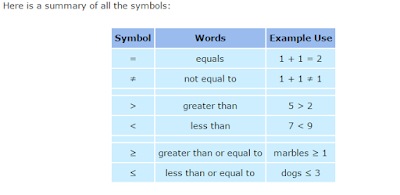Mathematics is not always about "equals"! Sometimes we only know that something is bigger or smaller
For Example;
Alex and Billy have a race, and Billy wins!
What do we know?
We don't know how fast they ran, but we do know that Billy was faster than Alex:
Billy was faster than Alex
We can write that down like this:
b > a
(Where "b" means how fast Billy was, ">" means "greater than", and "a" means how fast Alex was)
We call things like that inequalities (because they are not "equal")
Alex plays in the under 15s soccer. How old is Alex?
But we do know "less than 15", so we can write:
Age < 15
The small end points to "Age" because the age is smaller than 15.
... Or Equal To !!
For Example;
You must be 13 or older to watch a movie.
The "inequality" is between your age and the age of 13.
Your age must be "greater than or equal to 13", which is written:
Age ≥ 13
Equal Greater or Less Than
As well as the familiar equals sign (=) it is also very useful to show if something is not equal to (≠) greater than (>) or less than (<)
Less Than and Greater Than
The "less than" sign and the "greater than" sign look like a "V" on its side, don't they?
To remember which way around the "<" and ">" signs go, just remember:
The "less than" sign and the "greater than" sign look like a "V" on its side, don't they?
To remember which way around the "<" and ">" signs go, just remember:
BIG > small
small < BIG
For Example;
10 > 5
"10 is greater than 5"
Or the other way around:
5 < 10
"5 is less than 10"
Do you see how the symbol "points at" the smaller value?
To show this, we add an extra line at the bottom of the "less than" or "greater than" symbol like this:
The "less than or equal to" sign: ≤
The "greater than or equal to" sign: ≥
All The Symbols
Why Use Them?
Because there are things we do not know exactly...
...but can still say something about.
So we have ways of saying what we do know (which may be useful!)
For Example;
John had 10 marbles, but lost some. How many has he now?
Answer;
He must have less than 10:
Marbles < 10
If John still has some marbles we can also say he has greater than zero marbles:
Marbles > 0
But if we thought John could have lost all his marbles we would say
Marbles ≥ 0
In other words, the number of marbles is greater than or equal to zero.






No comments:
Post a Comment